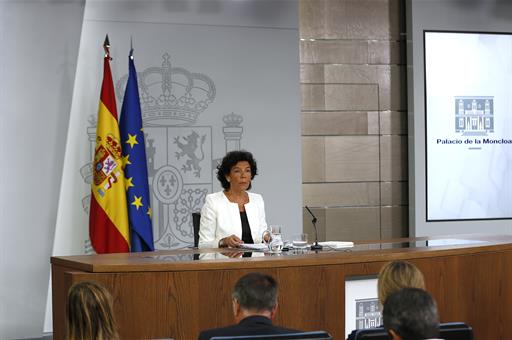Council of Ministers
Government will revise reform of Criminal Procedure Act from a gender perspective
Council of Ministers - 2018.8.31
Moncloa Palace, Madrid
The Council of Ministers approved the creation of an advisory council to revise the Criminal Procedure Act from a gender-based focus, in order to push through a new regulatory text that suitably caters for the social reality.
This council will propose the reforms necessary to adapt the current legal system to the new demands made by society on gender issues, particularly at a civil and criminal level, which thus constitutes a priority goal for the government.
The Minister for Education and Vocational Training and Government Spokesperson, Isabel Celaá, highlighted that the majority of the council members will be "women of great prestige in the fields of education and gender studies".
The council members will not be remunerated and its functioning will be funded by the Ministry of Justice, and hence will not increase public spending.
Attention for unaccompanied minors
The government regulated the direct granting of a subsidy to the cities of Ceuta and Melilla to improve the attention offered at reception centres for unaccompanied minors. 2,345,000 euros will be allocated to Ceuta and 4,103,890 to Melilla.
Isabel Celaá acknowledged that there are unaccompanied minors in other autonomous regions, and that hence this issue will be addressed at a meeting planned for the start of September.
The protection of children, highlighted the Government Spokesperson, is another of this government's priorities. To that end, she announced, the government "is drafting a Comprehensive Law on Childhood which will contain many of the policies that the different ministerial departments carry out". We consider that there are grounds for public, social and humanitarian interest to work in this way", she added.
Humanitarian attention for immigrants
The Council of Ministers authorised the Directorate General for Integration and Humanitarian Attention to grant a direct subsidy to the Spanish Red Cross for the sum of 18,741,059 euros for humanitarian attention for immigrants in a vulnerable situation.
Isabel Celaá recalled that the State Secretariat for Immigration has a fund of 40.7 million euros to this end to be allocated to different NGOs.
Highways
As regards infrastructures, the government authorised six contracts for the maintenance and operation of State highways to be put out to tender for a total sum of 138 million euros. The sectors where these works will be implemented are located in the provinces of Barcelona, Burgos, A Coruña, Huesca, Lleida and León.
The Council of Ministers also agreed to implement discounts for heavy vehicles and toll exemptions for light vehicles on certain stretches of the AP-7 and AP-2 toll motorways.
Specifically, traffic will be diverted from the N-340 highway between the towns of Peníscola-L´Hospitalet de Línfant and Altafulla-Villafranca, and from the N-240, on the stretch of Les Borges Blansques-Montblanc, to alternative stretches of motorway.
The Government Spokesperson explained that the government has expedited the approval of this measure to avoid "heavy vehicles travelling through small villages on secondary roads" and to encourage them to use toll roads.
Furthermore, exemptions will be applied on tolls for light vehicles on the stretch between Vilafranca Sur and Vinaroz/Alcanar in order to boost the use of the AP-7 by habitual users.
The Ministry of Public Works estimates that these decisions will reduce congestion and pollution on these stretches of national highways and will maximise the use of motorways, which will foreseeably improve road safety.
Exhumation of Franco
Following the approval last week of the Royal Decree-Law to exhume the remains of Francisco Franco from the Valley of the Fallen [Valle de los Caídos], the Council of Ministers agreed on Friday to open the administrative file in order to initiate this procedure.
The Government Spokesperson pointed out that the file will be published and the interested parties in the proceedings will be duly notified.
Workers' rights and prevention of money laundering
The Council of Ministers approved a Royal Decree-Law to transpose three European directives that were pending incorporation into Spanish legislation, explained Isabel Celaá, who recalled the government's "pro-European vocation".
The first of these directives seeks to strengthen the mobility of workers between different Member States of the European Union or at a national level, guaranteeing certain rights or benefits that they enjoyed in the company of origin. The Government Spokesperson specified that, in the case of Spain, the question is for workers to maintain their welfare insurance when changing jobs.
The aim of the second directive transposed is to prevent the financial system being used for money laundering and the financing of terrorism. Isabel Celaá framed this law within the "major movement in Europe to fight financial flows from illegal gains". The text unifies the application of enhanced due diligence for all public servants, increases the maximum limits of penalties and fosters the reporting of individuals.
Lastly, the Royal Decree-Law transposes the requirements for the entry into and residency in Spain of third-country nationals for the purposes of research, study, work experience, student exchange programmes and educational projects.
Other agreements
- Approval of agreement on mobility of young people between Spain and Argentina.
- 77- million euro increase in spending on agricultural insurance.
- Agreement between Spain and Romania to eliminate double taxation and prevent tax evasion sent for passage through Parliament.
Non official translation





